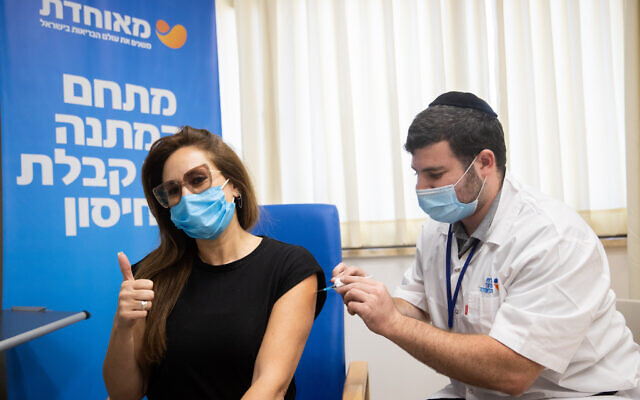Israelis Getting Armed with Fourth COVID Shot
As pandemic numbers skyrocket, thousands of Israelis sign up for second booster.

First it was Israeli medical workers offering their arms for a second booster shot to test whether there would be any bad side effects and, just as importantly, any measurable benefits. Almost immediately, the results encouraged Israeli Prime Minister Naftali Bennett to endorse the fourth inoculation of all medical workers and anyone over 60, plus immunocompromised Israelis. Thousands instantly signed up.
According to Magen David Adom, the Israeli equivalent of the American Red Cross, Israel is the first country to begin administering a fourth round of the vaccine.
Epidemiologists in the United States are watching carefully. So is the rest of the world, if the attendance at an international press conference held by the Israeli Ministry of Health on Jan. 10 is any indication.
Nearly 200 scientists and members of the press from around the world participated in the virtual meeting, including Croatia, Russia, Turkmenistan, France, the U.K., Germany, Rwanda, Brazil, the Netherlands and Mexico. Although there were a range of accents, the questions mostly focused on the latest COVID-19 variant, Omicron, and its rampant spread through the world’s population.

The new variant, said Asher Salmon, head of the international relations department of the Ministry of Health, is doubling “nearly three times as quickly as previous variants.” Although Omicron appears to be a milder variant, impacting the upper respiratory system rather than the lower lungs, “if one in five people need hospitals, the hospitals will be overwhelmed.”
Salmon stressed that Israel is not offering the fourth shot to just anyone. He expressed concern about giving the second booster without more studies. “Usually there are clinical trials, but that would take a few years,” he said. “We are dealing with an emergency situation,” and that’s why the U.S. Food & Drug Administration has approved “emergency authorization” for COVID shots.
Preliminary results from an Israeli study at the Sheba Medical Center indicated that a fourth vaccine dose produced a fivefold increase in the level of antibodies. But Salmon believes that in two to three weeks there will be “more substantial studies” of the effectiveness and need for the fourth shot. Those results will, of course, be shared with the rest of the world, he said.
So far, there is “little data to support a fourth vaccine” in the U.S., said Harry Heiman, clinical associate professor in the Department of Health Policy and Behavioral Sciences at Georgia State University. He believes that people who have received the first two primary shots, as well as the booster, “have strong protection against hospitalization” due to infection by Omicron. “The cellular level response is still intact.”
Rather than fourth shots, Heiman is more focused on protecting the more than 30 percent of Americans who have not been vaccinated at all and the more than 75 percent who have not received their boosters. “If we look at the people being hospitalized or dying, it’s overwhelmingly those who aren’t vaccinated,” he said.

The same is true in Israel. That’s why Israeli Prime Minister Naftali Bennett is also emphasizing vaccinations. In his Jan. 2 address about the fourth vaccine, he noted that “recent mortality in Israel has been among the lowest in the world. In Britain, mortality per capita is 50 times greater. In Germany it is 100 times as great. In the U.S., it is 130 times greater than in the State of Israel.”
Israel has a younger population than the U.S. and it is mostly the youth who have not received vaccinations. Overall, close to 65 percent of Israelis have been vaccinated twice, with about 46 percent receiving three shots, according to the government. It’s too early to get statistics on how many have received the fourth shot.
But there are government predictions that as many as 40 percent of Israelis will become infected with Omicron, even as the Delta variant continues to spread as well. The country is logging its highest number of new cases a day, nearly every day. But that statistic is becoming nearly irrelevant both in Israel and the U.S. because an increasing number of people are using in-home antigen tests, and if they aren’t going to the hospital, those positive results aren’t being collected.
Israeli media has reported that at least two Israeli embassies and one consulate around the world have had to close due to COVID outbreaks. That has not been the case here in Atlanta. Anat Sultan-Dadon, consul general to the Southeast United States, told the AJT that the consulate “is committed to remaining open and fully working throughout the pandemic, while making the necessary adaptations in order to ensure the health and safety of our employees during this unique situation. These adaptations have included holding meetings remotely, alternating work from the office/from home when deemed necessary and the provision of consular services via mail where possible.”

Sultan-Dadon, who started her four-year term in Atlanta just months before the pandemic outbreak, added, “I am pleased to say that all employees have been fully vaccinated and hope that this, too, will help ensure their safety during this pandemic, as well as help ensure the continued work of the consulate.”
Both Heiman and Salmon emphasize that vaccines are not the only tool to use against COVID. “We need to have a longer-term game plan,” said Heiman, which includes high-quality masks in public settings and better ventilation systems. “We should approach this less reactively and more proactively, which includes using all tools available,” he said.
Heiman also said that Americans “should focus on getting friends and neighbors vaccinated and boosted.”
In both countries, the changing guidelines have resulted in confusion. On Jan. 9, the Israeli Ministry of Health’s hotline for answering citizens’ questions collapsed under heavy demand. Salmon acknowledged that government policies related to the pandemic have had to be modified at times. “It’s trial and error. We have to learn,” he said.
- Jan Jaben-Eilon
- Israel news
- News
- Israel
- fourth vaccine
- Asher Salmon
- Israeli Ministry of Health
- Harry Heiman
- Georgia state university
- Anat Sultan-Dadon
- pandemic
- naftali bennett
- medical workers
- Vaccinations
- immunocompromised Israelis
- Magen David Adom
- Epidemiologists
- Croatia
- russia
- Turkmenistan
- france
- United Kingdom
- Germany
- Rwanda
- brazil
- Atlanta
- Netherlands
- Mexico
- COVID-19 variant
- omicron
- U.S. Food & Drug Administration
- COVID Shots
- Sheba Medical Center
- Delta variant
- Israeli media
- Consul General of Israel to the Southeast



comments